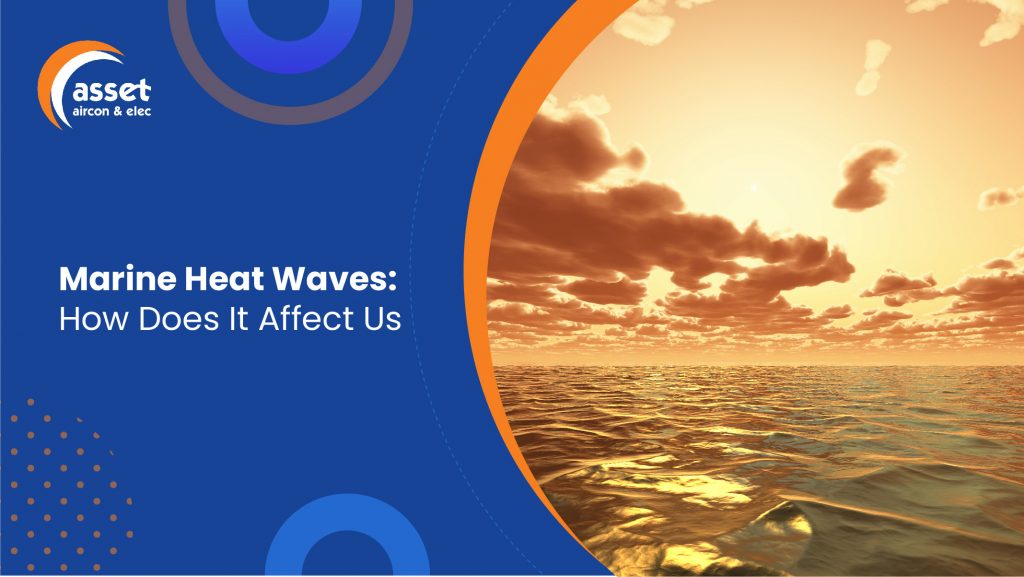In recent years, the world has witnessed a concerning increase in the frequency and intensity of marine heatwaves. These prolonged periods of unusually warm sea surface temperatures have significant implications for marine ecosystems and our daily lives. In this article, we will explore the impact of marine heatwaves and their role in the broader context of global warming adaptation. Join us as we dive into the depths of this issue to understand how it affects us all.
Table of Contents
What Are Marine Heatwaves?
The Connection to Global Warming
Effects on Marine Ecosystems
- Coral Bleaching
- Disruption of Food Chains
Impact on Human Activities
Air Conditioning Gold Coast | Asset Aircon & Elec: Cooling Solutions
Mitigating Marine Heatwaves
- Reducing Carbon Emissions
- Sustainable Fishing Practices
The Human-Environmental Connection
Adapting to the Changes
Marine Heatwaves: A Growing Concern
Protecting Coastal Communities
Conclusion
What Are Marine Heatwaves?
Marine heatwaves are characterized by abnormally high sea surface temperatures that persist for weeks or even months. These periods of elevated temperatures are not just anomalies; they are becoming more commonplace and enduring due to the changing climate. These events are often accompanied by alterations in weather patterns, which can include shifts in rainfall patterns and changes in wind direction.
As marine heatwaves become more frequent and intense, they have severe consequences for marine ecosystems and human societies. These prolonged periods of elevated sea temperatures can disrupt the natural balance of oceanic life, leading to numerous challenges, including coral bleaching and disruptions in marine food chains. Furthermore, the associated changes in weather patterns can exacerbate the risk of extreme weather events, impacting coastal communities and infrastructure.
The Connection to Global Warming
Global warming is the primary driver behind the increasing frequency and intensity of marine heat waves. As greenhouse gas emissions continue to rise, the Earth’s average temperature increases, leading to higher ocean temperatures. This connection between global warming and marine heatwaves underscores the urgency of addressing climate change.
Global warming is a complex issue with far-reaching implications. It results from releasing greenhouse gases, such as carbon dioxide and methane, into the atmosphere primarily through human activities like burning fossil fuels and deforestation. These gases trap heat from the sun within the Earth’s atmosphere, creating a “greenhouse effect” that causes temperatures to rise globally. This, in turn, affects ocean temperatures and contributes to the intensification of marine heatwaves.
Effects on Marine Ecosystems
Coral Bleaching
Coral bleaching is one of the most visible and devastating effects of marine heatwaves. High sea temperatures cause corals to expel the symbiotic algae living within their tissues, losing vibrant colors and increasing susceptibility to disease. Coral reefs, which support diverse marine life, risk irreparable damage.
Coral bleaching is an aesthetic concern and a significant ecological one. Coral reefs are often called the “rainforests of the sea” due to their incredible biodiversity and their critical role in supporting various marine species. When corals bleach and die, entire ecosystems that depend on them are at risk. This includes fish species that use coral reefs as nurseries and food sources and the communities that rely on fisheries for their livelihoods.
Disruption of Food Chains
Marine heatwaves disrupt the delicate balance of marine food chains. Species unable to adapt to warmer waters or migrate may face extinction. This can have cascading effects throughout the ecosystem, impacting fisheries and the livelihoods of coastal communities.
Food chains in the ocean are complex and interconnected. When a key species within a food chain is affected by a marine heatwave, it can have far-reaching consequences. For example, if plankton populations decline due to increased ocean temperatures, this can impact the species that feed on them, such as small fish. This, in turn, affects larger predators and can lead to imbalances in marine ecosystems.
Impact on Human Activities
The effects of marine heatwaves are not confined to the ocean; they also affect human activities. Coastal communities often rely on fisheries for their livelihoods, and disruptions in fish populations due to heatwaves can lead to economic hardships. Additionally, warmer sea temperatures can intensify storms, increasing the risk of coastal damage.
Coastal communities worldwide depend on healthy oceans for sustenance and economic prosperity. The fishing industry is a critical source of income and food for many of these communities. When marine heatwaves disrupt fish populations, it can lead to reduced catches, economic losses, and even job insecurity for those who rely on fishing as their livelihood.
Furthermore, the warmer sea temperatures associated with marine heatwaves can contribute to the intensification of tropical storms and hurricanes. These storms can cause extensive damage to coastal infrastructure, including homes, businesses, and critical infrastructure like power plants and water treatment facilities. As sea levels rise due to global warming, coastal communities are becoming increasingly vulnerable to the impacts of such extreme weather events.
Air Conditioning Gold Coast | Asset Aircon & Elec: Cooling Solutions
Companies like Air Conditioning Gold Coast | Asset Aircon & Elec are pioneering innovative cooling solutions to combat the rising temperatures. Advanced air conditioning systems and cooling technologies are essential for maintaining comfortable living and working environments in the face of increasing heatwaves.
Air Conditioning Gold Coast | Asset Aircon & Elec is at the forefront of providing effective cooling solutions to combat the challenges posed by rising temperatures. Their innovative air conditioning systems are designed to be energy-efficient, reducing both electricity bills and carbon emissions. These cooling solutions are vital for individual comfort and safeguarding the health and well-being of people living in regions prone to heatwaves.
In regions like the Gold Coast, where temperatures are soaring, air conditioning is not a luxury but a necessity. Installing energy-efficient air conditioning systems can help individuals and businesses reduce their carbon footprint while staying cool during heatwaves.
The Gold Coast, known for its beautiful beaches and warm climate, is particularly susceptible to the effects of marine heatwaves. With temperatures frequently reaching high levels, having access to effective air conditioning systems is vital for comfort and health. Energy-efficient air conditioning keeps indoor spaces at a comfortable temperature and reduces energy consumption, contributing to a more sustainable future.
Mitigating Marine Heatwaves
Reducing Carbon Emissions
We must prioritize reducing carbon emissions to address marine heatwaves and their connection to global warming. Transitioning to renewable energy sources and adopting sustainable practices is crucial in mitigating the impact of climate change on our oceans.
Reducing carbon emissions is an urgent global priority. Burning fossil fuels, such as coal, oil, and natural gas, is a major source of carbon dioxide emissions. These emissions contribute to the greenhouse effect and the warming of our planet. To combat marine heatwaves and other consequences of climate change, nations worldwide must transition to cleaner and more sustainable energy sources, such as wind, solar, and hydroelectric power. Additionally, individuals can reduce their carbon footprint through energy conservation and sustainable transportation choices.
Sustainable Fishing Practices
Sustainable fishing practices, such as implementing catch limits and protecting vulnerable species, can help maintain the health of our oceans and ensure that fish populations can recover from the stress caused by marine heatwaves.
Sustainable fishing practices are essential for preserving marine biodiversity and ensuring the long-term viability of fisheries. Implementing catch limits and protecting vulnerable species are key components of sustainable fishing. By adhering to these practices, we can help fish populations recover from the impacts of marine heatwaves and maintain healthy ocean ecosystems.
The Human-Environmental Connection
The well-being of humanity is intricately linked to the health of our environment. Recognizing the connection between our actions and the state of the oceans is essential for ensuring a sustainable future for generations to come.
Our relationship with the environment is symbiotic. As we impact the environment, the environment, in turn, affects us. Marine heatwaves serve as a stark reminder of this interconnectedness. By understanding the consequences of our actions on the oceans and taking steps to mitigate those impacts, we can ensure a healthier planet for current and future generations.
Adapting to the Changes
As marine heatwaves become more common, adapting to these changes is vital. This includes investing in resilient infrastructure, protecting coastal communities, and fostering greater awareness of the importance of preserving our oceans.
Adaptation is crucial to addressing the challenges posed by marine heatwaves and climate change in general. Investing in resilient infrastructure that can withstand extreme weather events is essential for protecting coastal communities from the impacts of rising sea levels and intensifying storms. Additionally, increasing public awareness about the importance of ocean conservation can lead to more responsible behaviors and support for initiatives to mitigate the effects of marine heat waves.
Marine Heatwaves: A Growing Concern
The frequency and intensity of marine heatwaves are rising, making them a growing concern for scientists, policymakers, and the public. Addressing this issue requires concerted global efforts to combat climate change.
Marine heatwaves are no longer a distant concern but a pressing issue that demands immediate attention. Scientists have observed a clear trend of increasing heatwave events, and the implications for marine ecosystems and human societies are profound. Addressing this challenge necessitates coordinated international efforts to reduce greenhouse gas emissions, protect vulnerable marine ecosystems, and build resilience in coastal communities.
Protecting Coastal Communities
Coastal communities are particularly vulnerable to the impacts of marine heatwaves. Efforts to protect these communities include implementing effective disaster preparedness plans and promoting sustainable coastal development.
Protecting coastal communities requires a multi-faceted approach. Effective disaster preparedness plans can help communities respond to extreme weather events, such as hurricanes and storm surges, triggered or exacerbated by marine heatwaves. Sustainable coastal development practices, including responsible land use planning and the preservation of natural barriers like mangrove forests, can enhance the resilience of these communities.
Conclusion
In conclusion, marine heatwaves are a significant consequence of global warming affecting our oceans and daily lives. Understanding the connection between these heatwaves and climate change is crucial for developing effective strategies to mitigate their impact. As we move forward, it is essential to prioritize sustainable practices, reduce carbon emissions, and protect our coastal communities.









